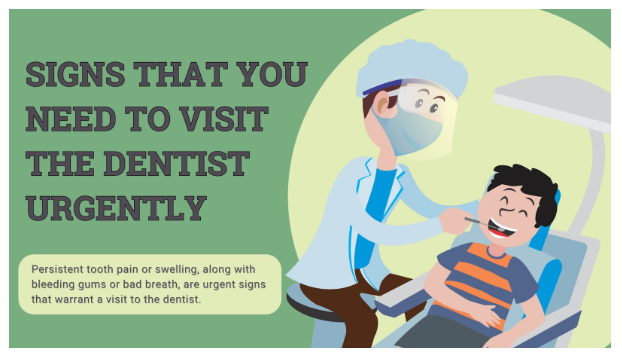Dr. Kevin Molldrem: Signs You Urgently Need Dentist
Are you experiencing constant tooth pain, swelling in the gums, or unusual sensitivity in your teeth? Dr. Kevin Molldrem says these are clear signals that you need urgent dental care. Future problems could become more severe if these symptoms are ignored. Don’t wait for the pain to worsen or for the problem to escalate. We suggest that visiting a dentist as soon as possible can ease discomfort and stop additional issues. Here is a look at some of the top signs that indicate you should visit the dentist.
A Knocked-out Tooth
You should see a dentist right away if your tooth is knocked out or comes loose after any kind of contact. Make no waits. Your chances of preserving the tooth increase with the timing of professional treatment. The dentist might be able to save and replace the tooth.
By grasping the tooth by the crown or the top, you can contribute in some small way. Stay away from the tooth root. Do not scrub the tooth—just rinse it. If it is possible, please place the tooth back into its socket. Otherwise, immediately make an appointment with the dentist and place the tooth in a small amount of milk.
- Serious dental emergency requiring immediate attention.
- Could result from trauma, advanced gum disease, or decay.
- Dentist can evaluate and recommend appropriate measures for restoration.
A Chronic Toothache
Chronic tooth pain is a clear indication that your mouth requires professional attention. The dentist will identify the source of the pain and suggest a course of action, regardless of whether you have a mild case of tooth sensitivity or an infected pulp. See a dentist right away if you are experiencing tooth pain to avoid needing to pay more for more extensive treatment down the road.
You have a swollen mouth or jaw
There are several reasons why a jaw can swell. In the rarest of circumstances, it may be brought on by cancer, an infection, or expanding lymph nodes. Gum swelling or tenderness is frequently a sign of discomfort, which can be an infection or gum disease. Gum disease that goes untreated can have major repercussions, such as tooth loss and jawbone deterioration.
Making an emergency appointment with the dentist enables a comprehensive examination to identify the source of the swelling and to initiate the necessary treatment to stop additional gum damage.
- Sign of gum disease or infection.
- Loss of teeth may occur if treatment is not received.
- Urgent dental visits are crucial to prevent further damage.
Your gums are bleeding
According to Dr. Molldrem, bleeding gums, especially during brushing or flossing, often indicate gum disease, a bacterial infection that can lead to gum recession and tooth loss if left untreated. Visiting the dentist urgently allows for a comprehensive evaluation of the gums’ health and the implementation of appropriate treatment to prevent further progression of the disease.
It’s not abnormal for gums to bleed a little after brushing or if you have been identified with gum disease. But if the bleeding is extreme, continuous, and coupled with pain or swelling, it’s important to see your dentist. Periodontal disease may be the cause of unexplained bleeding.
- Often a sign of gum disease.
- Can lead to gum recession and tooth loss if left neglected.
- Dental evaluation is needed to prevent disease progression.
Sensitivity to Temperature:
All three of these conditions tooth loss, gum recession, and sudden sensitivity to hot or cold foods and drinks may be present. Treating this sensitivity early on is crucial to avoiding additional harm to the teeth and supporting tissues. To alleviate pain and safeguard the teeth, a dentist can determine the degree of sensitivity and suggest appropriate treatment options, such as desensitizing medications or dental restorations.
- Indicates enamel erosion, gum recession, or decay.
- Addressing sensitivity promptly is crucial to preventing further damage.
- Dentists can recommend suitable treatments for relief.
Persistent bad breath:
Dental problems such as gum disease, cavities, or oral infections can cause chronic bad breath, also known as halitosis. If you do not deal with it, it can have a big effect on your social interactions and confidence. A dentist can determine the root cause of bad breath and suggest the best course of action to effectively treat it when a patient seeks emergency dental care. To retain good oral health and fresh breath, this may entail expert cleanings, therapy for underlying dental issues, and individualized oral hygiene regimens.
- due to dental cavities, gum disease, or oral infections.
- affects social interactions and self-confidence.
- Effective underlying cause identification and treatment are possible with prompt dental care.
Final Words:
Dr. Kevin Molldrem wants you to know that if you’re having any urgent dental issues, don’t wait to get help. Ignoring these problems could make them worse. Getting treatment quickly can help stop any pain and keep your teeth and gums healthy. Make sure to put your oral health first and call your dentist as soon as possible to book an appointment.

